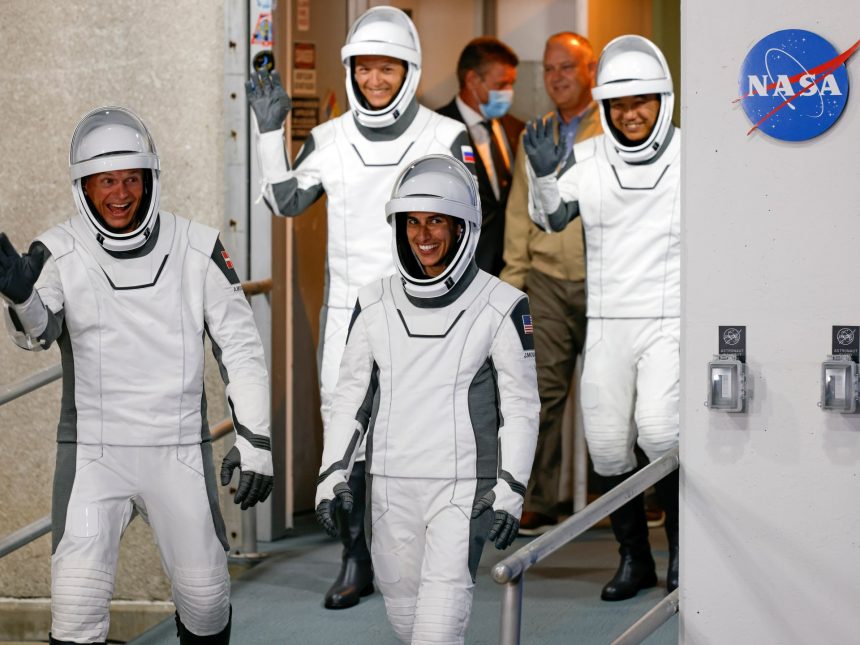The eighth crewed flight on Elon Musk’s Dragon spacecraft has blasted off for the International Space Station, carrying astronauts from the US, Denmark, Japan and Russia.
NASA and SpaceX’s Dragon spacecraft has blasted off carrying four astronauts to the International Space Station (ISS).
The Crew-7 mission is commanded by American Jasmin Moghbeli and includes Andreas Mogensen of Denmark, Satoshi Furukawa of Japan and Konstantin Borisov of Russia.
The Dragon spacecraft carried by a Falcon 9 rocket lifted off at 3:27am (07:27 GMT) from Launch Complex 39A at NASA’s Kennedy Space Center in Florida, in front of about 10,000 people gathered to watch the launch.
“We have liftoff!” NASA said on X, formerly known as Twitter.
Cheers could be heard in the mission control room soon after the Dragon craft separated from the Falcon 9 rocket with the crew in orbit.
“We may have four crew members on board from four different nations … but we’re a united team with a common mission,” Moghbeli said after the separation.
It is the eighth crewed flight on multibillionaire Elon Musk’s Dragon spacecraft.
We have liftoff! Endurance ascends to space. Next stop for #Crew7: the @Space_Station. pic.twitter.com/UW5Db3HH7C
— NASA (@NASA) August 26, 2023
The launch was pushed back to Saturday to give engineers an extra day to review a component of the Crew Dragon capsule’s environmental control and life support system, NASA said in a blog post.
After just under 24 hours, the spacecraft is expected to dock at the human outpost about 400km (249 miles) above the Earth and will bring four crew members back home a few days later.
It is the first space mission for Moghbeli and Borisov.
“This is something I’ve wanted to do for as long as I can remember,” said Moghbeli, a naval test pilot, during a media call last month.
“One of the things I’m most excited about is looking back at our beautiful planet,” added the 40-year-old American.
“Everyone who I’ve talked to who has flown already has said that was a life-changing perspective – and also floating around in space, it seems really fun.”
Crew-7 is set to be the seventh routine mission to the orbital platform for Elon Musk’s SpaceX, with the first coming in 2020.
NASA pays SpaceX for the taxi service as part of a commercial crew programme that it put in place to reduce dependency on Russian rockets for astronaut transport after the space shuttle programme ended in 2011.
Boeing is the other contracted private partner, but its programme remains mired in delays and technical difficulties. It has not yet flown any crew.
Borisov will be the third Russian to fly on a SpaceX Crew Dragon capsule, fixed atop a Falcon 9 rocket.
Cooperation zone
Space remains a rare area of cooperation between the United States and Russia despite Moscow’s invasion of Ukraine, with Americans also continuing to fly on board Russian Soyuz rockets that launch from Kazakhstan.
The crew will spend six months on board the ISS, where they will carry out science experiments including collecting samples during a spacewalk to determine whether the station releases microorganisms through its life-support system vents.
The goal is to understand if microorganisms can survive and reproduce in space.
Another experiment will aim to assess the physiological differences between sleep on Earth and in space.
“I’m looking forward to coping with all the tasks. This is a very interesting profession: you are preparing for something that you haven’t tried yet, and you really want to do it well,” said Borisov.
Crew-7 will join the seven people already on board the ISS before members of Crew-6 leave for Earth a few days later. This marks the seventh rotation of the ISS crew since 2020.
The returning members of Crew 6 consist of Stephen Bowen and Warren Hoburg from the US, the Russian Andrey Fedyaev and the Emirati Sultan al-Neyadi. A total of seven people are currently on the ISS.









